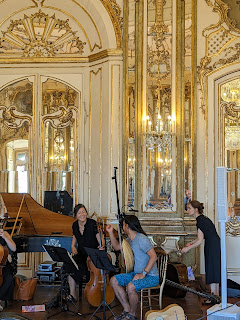More Great Chamber Music in Belém
The final faculty concert of the summer workshop Ver ão Clássico was performed on 29 July in the resplendent Coach Museum in Belém. As in the last concert I saw there, the performance standards were very high, with spirited performances of varied pieces, some quite unfamiliar to me. The opening Beethoven Piano Trio in E flat , Opus 1/1 was composed in 1795 when the composer was in his early 20's, and is among his earliest published works. During this period he was mostly known as a piano virtuoso, but was already studying composition with Haydn and Salieri. He was also avidly studying the works of Mozart, who had recently died. The piano trio reflects his studies, and sounds quite Mozartian, with charming melodies and a lighter more purely classical texture than Beethoven would develop in the coming years. There is not much of the later Beethoven to be heard, but the piano part is quite virtuosic, and was superbly played here by the Ukrainian pianist Milana Chernyavska....

_DVD_cover.jpeg)